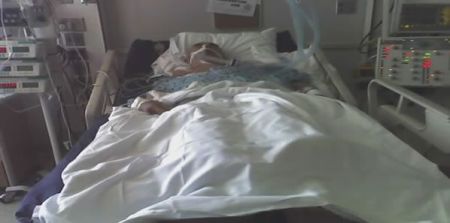Acute kidney injury (AKI) is a common complication after cardiac surgery and is generally associated with a poor prognosis. It is also an independent mortality factor in cardiac surgical patients.
Cardiac surgery is typically performed under general anaesthesia with patients mechanically ventilated in the postoperative period until they have achieved normothermia and haemodynamic stability. A primary risk factor for the development of AKI is mechanical ventilation, and ventilation with high tidal volume has often been associated with postoperative organ dysfunction in patients after cardiac surgery. To date, the duration of postoperative positive pressure ventilation has not been evaluated as a factor that could potentially mediate cardiac surgery-associated AKI.
An observational trial was conducted with 585 elective cardiac surgical patients. The objective was to analyse the association between preoperative cerebral oxygen saturation and post-operative dysfunction. The incidence of AKI was analysed in patients with different times to extubation.
Cardiac surgery in these patients was performed during mild hypothermia. After surgery, patients were transferred to the ICU. Postoperative ventilation was performed with biphasic intermittent positive airway pressure (BIPAP) and pressure support ventilation (PSV). Adjustments in ventilatory support and weaning from the respirator and extubation were determined by the attending physicians of the ICU. The severity of postoperative kidney dysfunction was measured by the Acute Kidney Injury Network (AKIN) criteria based on perioperative changes in plasma creatinine and urine flow.
The results of the study showed that 28.3 percent of patients developed AKI (any stage) and 7.4 percent needed renal replacement therapy. Those patients who developed AKI had a significantly lower renal perfusion pressure (RPP) in the first eight hours after surgery as compared to patients with a postoperatively preserved renal function. The rate of AKI increased from 17 percent in patients extubated within four hours postoperatively to 62.3 percent in patients ventilated for more than 16 hours. The analysis also showed that the time to the first extubation and RPP were independently associated with AKI. With the exception of 10 patients, the majority of patients developed AKI in in the immediate period after surgery.
These findings suggest that the duration of postoperative positive pressure ventilation is an important and unrecognised risk factor for AKI in cardiac surgical patients. The duration of postoperative positive pressure ventilation is also independent from low RPP as an AKI trigger. The findings also suggest that even a moderate delay of extubation can increase the risk of AKI.
Source: Critical Care Forum
Image Credit: Flickr
Cardiac surgery is typically performed under general anaesthesia with patients mechanically ventilated in the postoperative period until they have achieved normothermia and haemodynamic stability. A primary risk factor for the development of AKI is mechanical ventilation, and ventilation with high tidal volume has often been associated with postoperative organ dysfunction in patients after cardiac surgery. To date, the duration of postoperative positive pressure ventilation has not been evaluated as a factor that could potentially mediate cardiac surgery-associated AKI.
An observational trial was conducted with 585 elective cardiac surgical patients. The objective was to analyse the association between preoperative cerebral oxygen saturation and post-operative dysfunction. The incidence of AKI was analysed in patients with different times to extubation.
Cardiac surgery in these patients was performed during mild hypothermia. After surgery, patients were transferred to the ICU. Postoperative ventilation was performed with biphasic intermittent positive airway pressure (BIPAP) and pressure support ventilation (PSV). Adjustments in ventilatory support and weaning from the respirator and extubation were determined by the attending physicians of the ICU. The severity of postoperative kidney dysfunction was measured by the Acute Kidney Injury Network (AKIN) criteria based on perioperative changes in plasma creatinine and urine flow.
The results of the study showed that 28.3 percent of patients developed AKI (any stage) and 7.4 percent needed renal replacement therapy. Those patients who developed AKI had a significantly lower renal perfusion pressure (RPP) in the first eight hours after surgery as compared to patients with a postoperatively preserved renal function. The rate of AKI increased from 17 percent in patients extubated within four hours postoperatively to 62.3 percent in patients ventilated for more than 16 hours. The analysis also showed that the time to the first extubation and RPP were independently associated with AKI. With the exception of 10 patients, the majority of patients developed AKI in in the immediate period after surgery.
These findings suggest that the duration of postoperative positive pressure ventilation is an important and unrecognised risk factor for AKI in cardiac surgical patients. The duration of postoperative positive pressure ventilation is also independent from low RPP as an AKI trigger. The findings also suggest that even a moderate delay of extubation can increase the risk of AKI.
Source: Critical Care Forum
Image Credit: Flickr
Latest Articles
Intubation, cardiac surgery, acute kidney injury, postoperative, extubation
Acute kidney injury (AKI) is a common complication after cardiac surgery and is generally associated with a poor prognosis. It is also an independent morta...



























